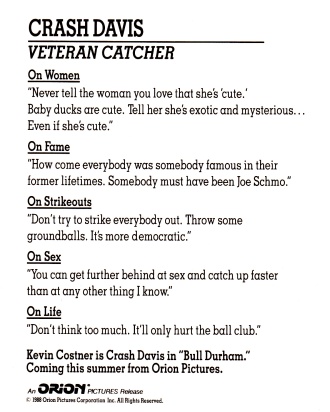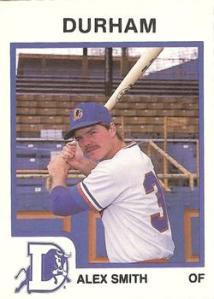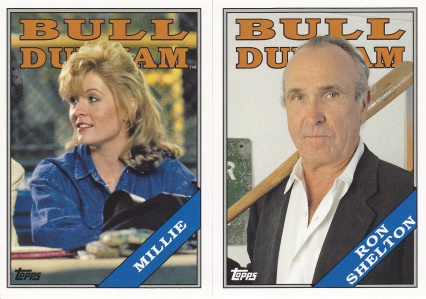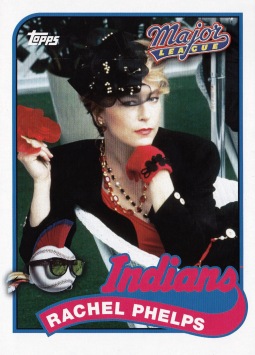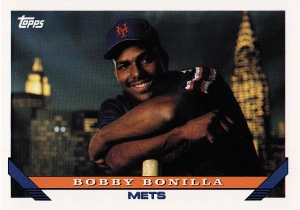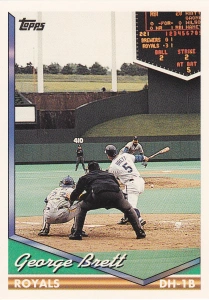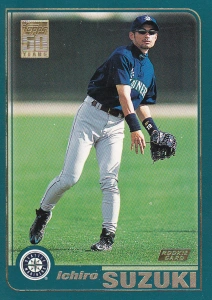It’s been a long while since I’ve done one of these – and frankly it had been a long time since I’d watched a baseball movie! This is one of my “Baseball & Culture” posts, and I finally got around to doing my favorite baseball movie. Field of Dreams is seminal, and if you’re willing to forgive a few some cuss words (I am, my wife doesn’t like it) – it’s actually a movie you can watch with kids. My 7 and 5 year old watched it with us and were enthralled!
Here’s the obligatory statement** – SPOILER ALERT!
**that hopefully isn’t necessary on an obscure baseball card blog on a post for a 1989 movie that is widely considered the greatest baseball movie of all time
Movie/Studio: “Field of Dreams”, Gordon Company, 1989
Director: Phil A. Robinson
- Kevin Costner – Ray Kinsella
- Amy Madigan – Annie Kinsella
- James Earl Jones – Terrance Mann (aka JD Salinger)
- Ray Liotta – Shoeless Joe Jackson
- Gaby Hoffmann – Karin Kinsella
- Burt Lancaster – Moonlight Graham
- Frank Whaley – young Moonlight Graham
- Timothy Busfield – Mark the brother-in-law who gets disturbingly angry at his niece!
- Dwier Brown – “Dad”
Field of Dreams was nominated for Best Picture at the Academy Awards and two other Oscars (Best Adapted Screenplay and Best Score).
Plot:
After growing up in Brooklyn with a widowed father who taught him his love for baseball – Ray Kinsella went to USC and met his wife Annie. He got in an argument with his father (John) and stopped playing catch with him when he was a teenager – and then told his dad that John’s hero, Shoeless Joe Jackson, was a criminal. Those were the last words he said to his Dad, who died while Ray was away at USC. He now lives on his farm in Iowa with his wife Annie and daughter Karin.
One evening, walking through his cornfield, he hears a voice – “IF YOU BUILD IT, HE WILL COME“. Ray deduces that he should build a baseball field there, and this will let the long deceases Shoeless Joe play baseball again. His wife has her doubts, but she’s a child of the 60’s and agrees to let him follow his heart despite the financial impacts to their farm.
After Ray spends months building the park, a ballplayer appears. Ray recognizes him as Shoeless Joe, a ghost who came out of the cornfield that is the edge of the new park’s outfield. Joe has a catch with Ray and asks if other players can come with him when he returns. When they do, Annie and Karin see the players, but Annie’s brother Mark (a banker) cannot and warns Ray he’s ruining his family financially. Later, the voice comes back and tells Ray to “EASE HIS PAIN“.
Ray & Annie attend a local PTA meeting organized to ban books by radical (and aloof) author Terence Mann (who is meant to be Catcher in the Rye author J.D. Salinger). Ray realized the voice was referring to Mann, who had coincidentally named one of his characters “John Kinsella” just like Ray’s father. Ray drives to Boston to take Mann to a game at Fenway Park, and after some tense moments the old author agrees to go.
At the game, Ray hears the voice again – “GO THE DISTANCE“, and sees the career MLB stats of Archibald “Moonlight” Graham on the Fenway scoreboard – 1 game in 1922, no at bats. Mann at first denies hearing the voice, but as Ray is about to leave , Mann admits he too heard it. The pair drives through the night to a small town in Minnesota where they learn that Graham had been a beloved local physician but he had passed away 15 years ago. But Ray runs into the physician during a late night walk, transported briefly to 1972. Graham tells him he was content he left baseball to become a doctor. Ray and Mann leave for the drive back to Iowa and on the way – pick up a young hitchhiker with a baseball bag who calls himself Archie Graham. Arriving at Ray’s farm, they find that now – not only are some of Shoeless Joe’s teammates there, but they have brought some other All-stars from the early 1900’s to field a second team. They need one more to make 18, and Archie Graham is perfect for the role. He gets his one at bat – and a few more – against Major League pitching.
The next morning, the players are back, but so is Mark – who still can’t see them. Mark tells Ray he’s brokered a deal that will save his family from financial ruin if he sells the farm. Karin speaks up, saying that people will come to watch the ball games, and Mann seconds the notion in an epic monologue. Mark, frustrated with Karin, knocks Karin off the bleachers and she is choking. Too far away from town to get a doctor, Graham leaves the field to save here, but becomes the older version of himself as he walks across the diamond. Now unable to return to his ball-playing youth, old Dr. Graham again reassures Ray that he has no regrets. He disappears into the corn – and now Mark can see the players and realizes Ray needs to keep the farm.
Shoeless Joe invites Mann to enter the corn, and Mann goes with him. Ray wants to go, but Joe tells him he’s not invited. Then Joe repeats the original phrase – “IF YOU BUILD IT, HE WILL COME“. Ray turns to home plate to sees his father – as a young ballplayer – taking off his catcher’s mask. Ray gets to introduce his father to his wife and daughter, then have a last catch as father and son. As they do, hundreds of cars are seen driving toward the field, and it is apparent that the people “will most definitely come”.
Big League Players in the Movie:
There are none that I’m aware of. But it’s a hell of a cast.
Baseball card connection: Unlike Costner’s other late 80’s baseball hit, there are very few baseball card ties to this movie. I can’t remember any discussion of cards within the movie, and there’s only one card I know of that shows a character in the movie. It’s naturally an uber-expensive one at that. In 2016, Topps released an autographed mini of Costner with the name “Kinsella” at the bottom. You’d have to pay multiple hundreds of dollars to score this one.
There’s also a little known card set of famous baseball writers that has the author of the inspiration for the movie – “Shoeless Joe”, by W.P. Kinsella.
Moonlight Graham also got some cards made after the movie, but it’s about the actual player not of Burt Lancaster.
Best quote: I could go all day here and ultimately, it’s not just one.
“If you build it, he will come” – the voice that speaks to Ray. This is the easiest and quickest to jump the mind. The voice says a couple other things, but ultimately it comes back to this quote and all that Ray did was to have his Dad meet his granddaughter, and more importantly to have one last catch with his son. I can’t watch that part without shedding a tear or fifty – if your dad died before you could say what you needed, of if (like me) he’s still alive and you haven’t played catch in 30 years, this is a movie for baseball fans and their dads.
“Is this Heaven?” – Shoeless Joe. “No, It’s Iowa” – Ray
See a good chunk of the the dialogue from Terrance Mann (aka JD Salinger and played by James Earl Jones) below.
Best song: “The Place Where Dreams Come True” – There are a few notable songs from the 60’s and 70’s throughout the movie, but the main score is the most recognizable. This is the last composition of the film before the end credits and I think has most of the main tunes you’d recognize from the film incorporated. The score of the film is wonderful, and plays a big part in how meaningful the film was and has stayed. It’s composed and conducted by James Horner. Horner’s score for Field of Dreams was nominated for an Academy Award, losing out on the Oscar to the score for The Little Mermaid. Horner, who died in 2015, would have his day – he won the Best Score Oscar for Titanic, which won Best Picture as well. He composed the score for 2 other Oscar-winning Best Pictures, Braveheart and Avatar.
Other Notable facts:
- Robinson and the producers did not originally consider Kevin Costner for the part of Ray because they did not think that he would want to follow Bull Durham with another baseball film. Obviously this obstacle was overcome.
- Ray Liotta has apparently never seen the movie. His mother was sick during filming and he associates it with that.
- Mann is based off of J.D. Salinger. Salinger threatened to sue if his name was used (not sure why the book was OK but not the movie), so they changed the name to Terrance Mann.
- Matt Damon and Ben Affleck were extras in the Fenway Park scene
- Madigan’s husband Ed Harris is believed by many to be “The Voice” – but Robinson won’t confirm who it is.
- Field of Dreams was never #1 at the box office – it was 2nd the week of May 12, 1989 behind See No Evil, Hear No Evil – a comedy I’d never heard of until looked this up. It ended up being a stronger word of mouth film. Major League, which was released a little earlier in 1989 and did reach #1 for 2 weeks, grossed $15 million less than Field of Dreams that year.
Shoeless Joe, played by Ray Liotta, is the main former player in the book. There are too many former players to mention at this time, but at some point I may go back to watch the movie again and update this post for all the players in the film.
***************
I’ve got to say, I hadn’t watched this movie in over a decade. I wish that wasn’t true. If you’re a baseball fan, you should watch it once a year at least. It’s ahead of its time in many ways. Most apparent to me was that it deals with racism in a way that made me feel like we haven’t moved forward at all in the past 21 years. We watched this a couple of weekends ago when the George Floyd related protests were still very new, and it was poignant. But the other part is that Kevin Costner plays a guy a lot like the baseball card collector in me. I just love this game better than any other, in many ways because of the connection with my Dad. It was hard to watch and not feel extreme sadness at the labor wars that MLB has had over the past 4-6 weeks. They have a plan to move forward with the 2020 season – I believe it will be derailed by this virus – but I’ve lost a lot of faith in the sport, way more than I did in 1994. Maybe that’s because I’m older. I have 3 kids, we’re trying to figure out if the oldest (who f*cking loves baseball) has a health issue. I don’t have time to be forgiving on the “billionaires v millionaires” issue. This movie helps me remember what I love about this sport, and I wish it was mandatory watching for every MLB player, executive and owner. Take the time to watch it again if you love baseball – you won’t be disappointed! There’s a last quote I didn’t put above, from James Earl Jones. America has forgotten this, I hope someday we can get it back.
“The one constant through all the years, Ray, has been baseball. America has rolled by like an army of steamrollers. It has been erased like a blackboard, rebuilt and erased again. But baseball has marked the time. This field, this game: it’s a part of our past, Ray. It reminds of us of all that once was good and it could be again. Oh… people will come Ray. People will most definitely come.”





